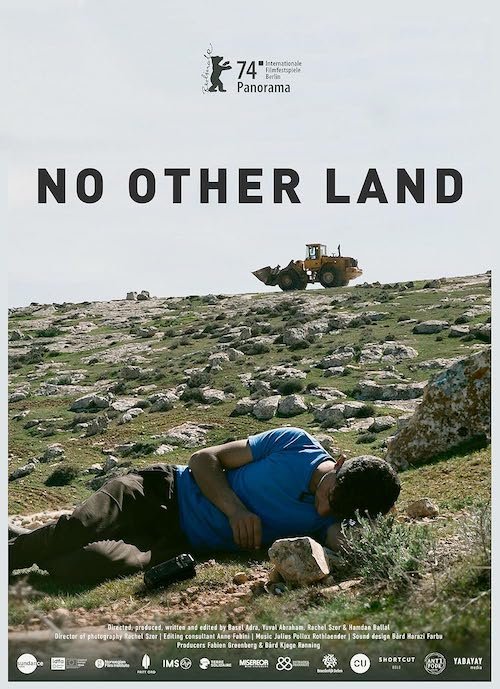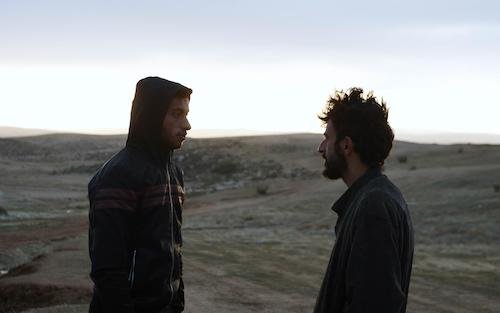No Other Land
Written by Andreas Babiolakis
Do I even need to explain the rift between Israel and Palestine, never mind the Gaza massacres of late? Needless to say, the centuries-long conflict is one of the trickiest topics to discuss, given the heat that persists through shattered hearts and frustrated faiths. The slaughter that has been shed all in the name of religion is a sensitive conversation to have, which goes without saying. So when a film like No Other Land comes along (especially since, by some miracle, there’s an actually positive angle throughout at least a good portion of this documentary), it makes sense why many heads were turned. How can a film about this topic be unbiased, succinct (it is an hour and a half, which feels impossible given the extent of the history here), and somehow uplifting at times? No Other Land is currently the frontrunner prediction to win Best Documentary Film at the Academy Awards this year that many prognosticators have made, and — regardless of subjective taste — it is clear why once you watch it.
We travel to Masafer Yatta, West Bank in the State of Palestine, where we meet activist and co-director Basel Adra, who has had to answer to the military malaise and abuse from Israeli soldiers. While documenting the geographical and systemic destruction caused — which has caused many Palestinian civilians to flee their homes and seek refuge — Adra met the Israeli journalist Yuval Abraham (who also helped direct No Other Land, alongside Rachel Szor and Hamdan Ballal): a man who is in touch with his culture but does not agree with the political and military-based decisions made by Israel. Adra and Abraham become close friends given their shared viewpoints about these conflicts, and their bond is one that is sure to put a smile on your face: it feels miraculous given how adamant politicians, the media, and other powerful forces are on creating divides between human beings.
No Other Land seeks solace and hope within the face of adversity and terror.
However, despite their similarities as kindred spirits, Adra and Abraham showcase how society forces them to be different in No Other Land. As a Palestinian man, Adra is forced to live a harder life in Masafer Yatta. He cannot vote. He is forever having to answer for every move he makes. He is threatened with abuse at every turn. Abraham, on the other hand, is presented a life of freedom and unlimited expression. He can vote. He can walk without having to have eyes at the back of his head. He doesn’t have to second guess any choice he makes. No Other Land acknowledges this disparity. Regardless, both men still find comfort and faith in one another.
Surrounding both focal points are shocking images of structural dismantling, military-based abuse in the streets, and even outright murders (something to take note before watching, in case seeing acts of killing is something you aren’t comfortable with [nor should you be]). We see a world crumbling around our two activists; they aren’t blind to these monstrosities, either (No Other Land isn’t some misguided attempt at ignoring the horrors of politics, religion, and war). Even so, No Other Land holds promise against all odds. It proves that mutual understanding, patience, and love can get us through anything. Now, No Other Land doesn’t lie like some family film that aimlessly instructs you to just love from the depths of your heart in hopes that all will be okay. The film knows that this is an uphill battle, but we can only destroy (or at least shrink) divide by uniting. The fact that it feels like No Other Land should be impossible says enough. No Other Land may not be the flashiest, most technical documentary of 2024, but it is certainly one that reminds you why the medium exists: to tell truths that exist as they are, whilst posing a hypothesis in a clear, achievable manner. No Other Land achieves a mind-boggling result of being a crowd pleasing documentary (especially given the subject) while never dumbing down its depictions of genocide and corruption.
Andreas Babiolakis has a Masters degree in Film and Photography Preservation and Collections Management from Ryerson University, as well as a Bachelors degree in Cinema Studies from York University. His favourite times of year are the Criterion Collection flash sales and the annual Toronto International Film Festival.







